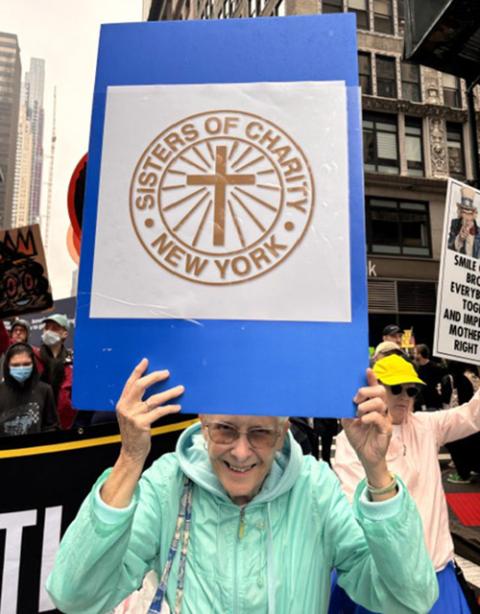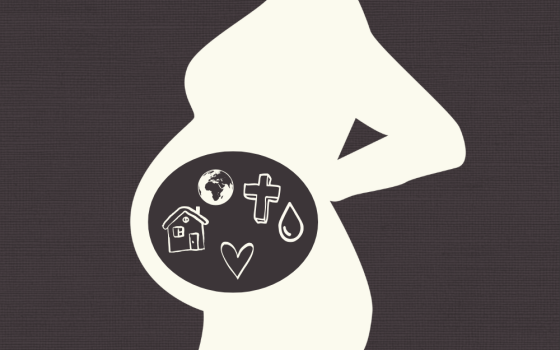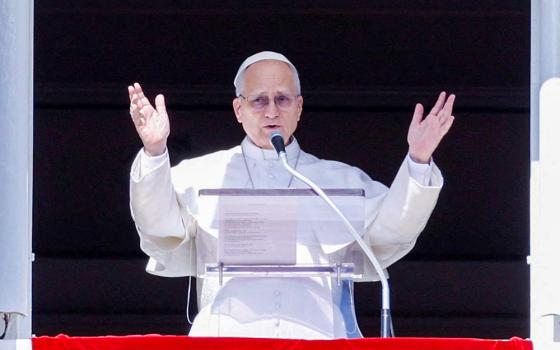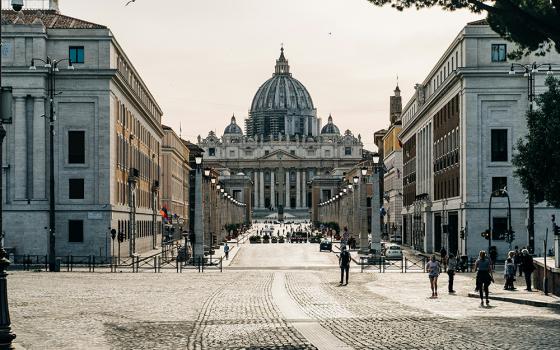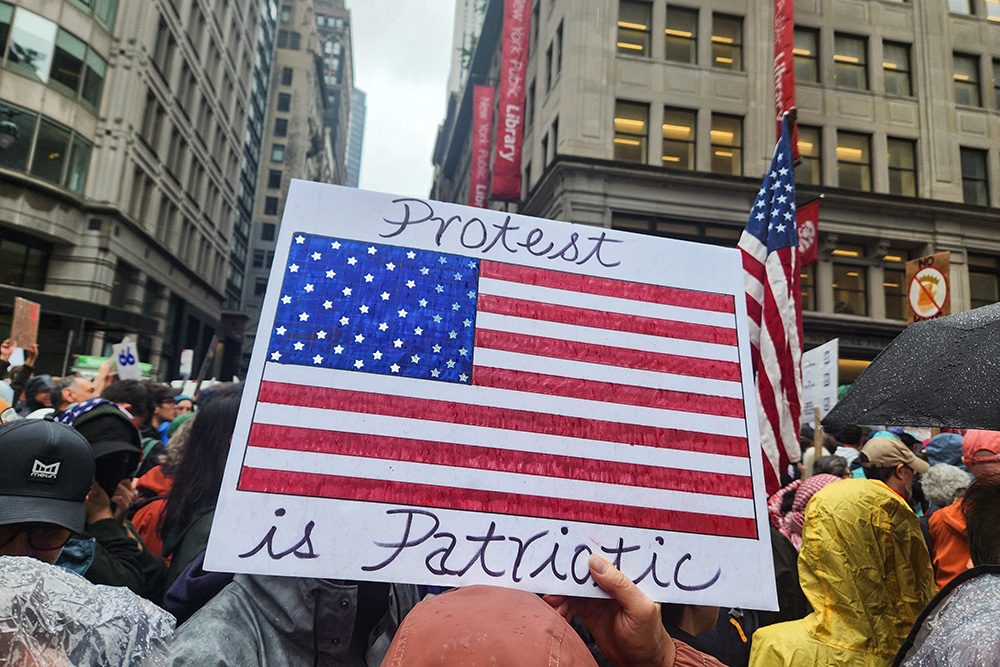
Signs appealing to patriotism and American values were common during the June 14 "No Kings" demonstration in Midtown Manhattan, N.Y. (GSR photo/Chris Herlinger)
Catholic sisters who participated in the June 14 "No Kings" demonstrations in the New York City area say they expect to participate in further protests this year as a way to signal solidarity with those on the margins and to affirm what they say are Gospel values.
"This is the beginning of a movement, and we need to continue," said Sr. Kathy Byrnes, a member of the Sisters of Charity of New York, who joined tens of thousands of New Yorkers in a peaceful march down Fifth Avenue in the borough of Manhattan.
The marches and rallies, held nationwide, were organized to protest President Donald Trump's policies on immigration and the social safety net, among other concerns. Organizers said demonstrators also wanted to show defiance in the face of what they say is rising government authoritarianism.
The demonstrations were also organized to counter a military parade in Washington, D.C., to celebrate the 250th anniversary of the U.S. Army and Trump's 79th birthday.
"It's a matter of justice and the Gospel," said Sr. Claire Regan, who joined four other Sisters of Charity at a demonstration in Yonkers, north of the city. "We need to bring people together, with 'We the People' as the banner cry."
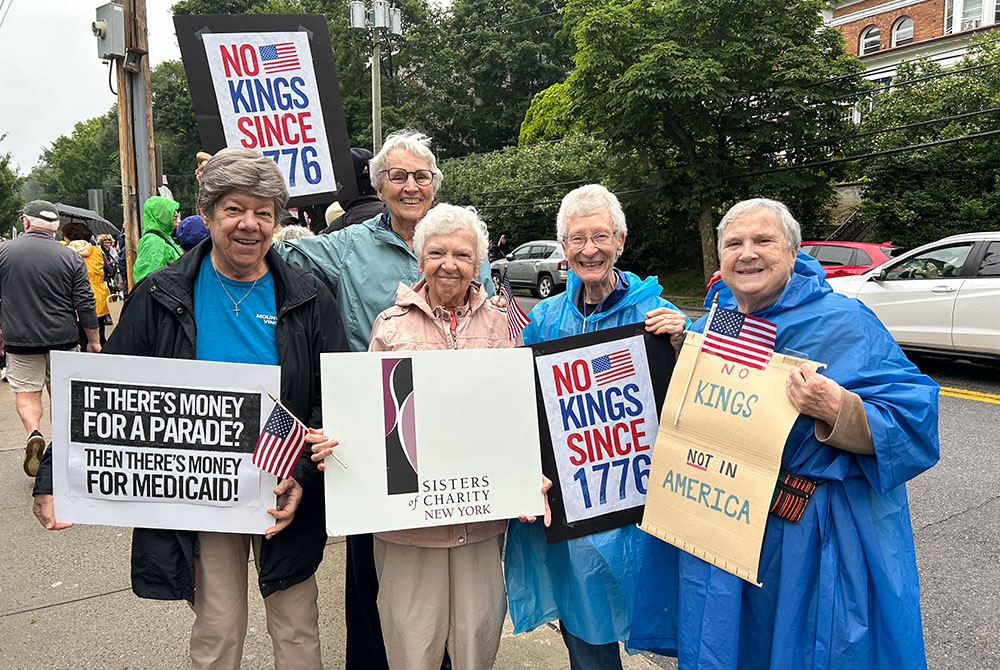
Sisters of Charity of New York attend a "No Kings" demonstration in Yonkers, New York, on June 14. From left: Srs. Donna Dodge, Virginia Searing, Mary Mc Cormick, Regina Bechtle and Claire Regan. (Courtesy of the Sisters of Charity of New York)
Beyond New York, demonstrations were also held in more than 2,100 locales nationally, in all 50 states, with organizers saying the turnout was in the millions. (The American Civil Liberties Union, a member of the coalition organizing the demonstrations, said in a statement that more than 5 million people participated.)
"There is something calling us to this time and place," Regan told GSR, adding that she and others felt a need to participate partly on behalf of those — such as immigrants — who either could not attend or were fearful of participating in a public rally.
"In America, we don't do kings," the "No Kings" organizers' web site said. The Trump administration has "defied our courts, deported Americans, disappeared people off the streets, attacked our civil rights, and slashed our services. The corruption has gone too far. No thrones. No crowns. No kings."
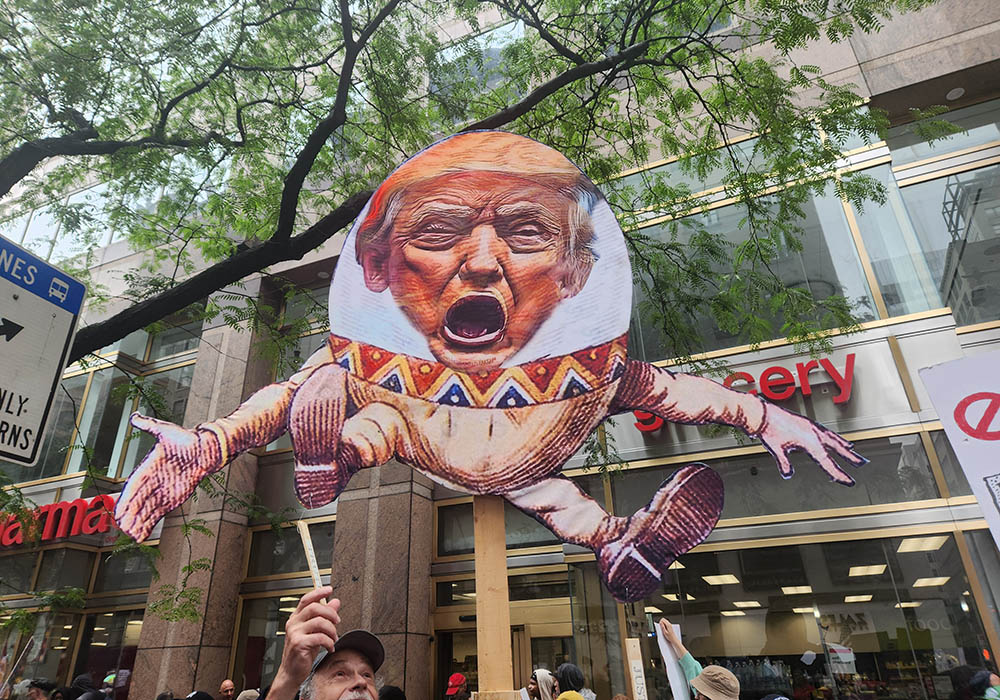
A comical depiction of President Donald Trump as Humpty Dumpty is seen during the June 14 "No Kings" demonstration in Midtown Manhattan, N.Y. (GSR photo/Chris Herlinger)
One independent data journalist said the protests may have been the single largest day of demonstrations in U.S. history.
"Based on hundreds of crowd-sourced records of No Kings Day event turnout, and extrapolating for the cities where we don't have data yet, it looks like roughly 4-6 [million] people protested Trump across the U.S. yesterday," independent data journalist G. Elliott Morris wrote on X the day after the protests.
In the Manhattan demonstrations, many held signs railing against the president, but other prominent concerns included defending immigrants in the wake of Trump administration crackdowns.
That was also a concern in the Yonkers demonstration, which Sr. Donna Dodge attended and called "uplifting" because "so many people [there] shared the values of sisters" and is "in contrast to everything we're hearing from our government."
Advertisement
"This has strengthened my hope in this year of Jubilee," said Dodge, president of the Sisters of Charity of New York.
"I think the demonstrations will continue — that they will keep growing," Dodge said, and that includes continued participation by sisters.
Byrnes, who praised the Manhattan event's "wonderful diversity" and its "aura of peace," said she and other sisters were not attending the demonstration for partisan political reasons. Rather, she said, it was to champion Catholic social teaching and calls for the common good — something she said the military parade did not exemplify.
"The expense of that," she said, "could be better spent on the needs of the common good," such as Medicaid and Medicare.
Overall, Byrnes said she believes the American Catholic Church and its bishops have not been as robust as they could be in publicly championing "a lot of social justice issues."
"I wish our bishops would speak out more," she said. "That's my constant hope, dream and prayer."
Regan said fellow demonstrators — particularly those once educated by Catholic sisters — were heartened to see the presence of sisters at the Yonkers demonstration, which she estimated may have drawn 1,000 people.
Diane Murray Ward, a "spoken word poet," was also among those participating in the Manhattan march, which began at Bryant Park in Midtown Manhattan and laced down Fifth Avenue amid intermittent rain and drizzle. She joined other members of the National Writers Union and called the event "a hallmark example of American response to obvious discontent and government disconnection."
The peaceful nature of the march, including a respectful police presence, and the handing out of water and fruit to marchers impressed Ward, she said to GSR.
"We proceeded as an uninterrupted force, confident and strong messengers; not as strangers, but one unified, sane, empathetic and sincere entity."

